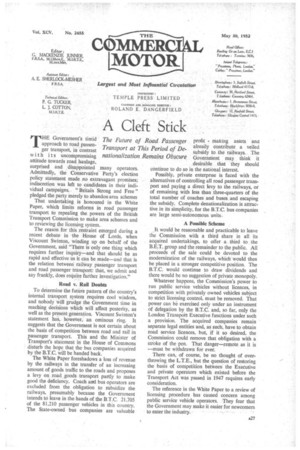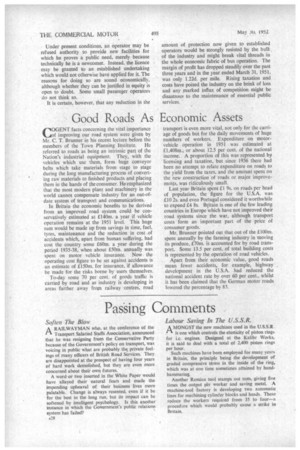A Cleft Stick
Page 29

Page 30

If you've noticed an error in this article please click here to report it so we can fix it.
Tapproach to road passenger transport, in contrast with its uncompromising attitude towards road haulage, surprised and .disappointed many operators. Admittedly, the Conservative. Party's election policy statement made no extravagant promises; indiscretion was left to candidates in their individual campaigns.. "Britain Strong and Free" pledged the party merely to abandon area schemes That undertaking is honoured in the White Paper, which limits reforms in road passenger transport to repealing the powers of the British Transport Commission to make area schemes and to reviewing the licensing system.
The reason .for this restraint emerged during a recent debate in the House of Lords, when Viscount Swinton, winding up on behalf of the Government, said "There is only one thing which requires further inquiry—and that -should be as rapid and effective as it can be made—and that is the relation between railway passenger transport and road passenger transport: that, we admit and say frankly, does require further investigation."
Road v. Rail Doubts To determine the future pattern of the country's internal transport system requires cool wisdom, and nobody will gradge the Government time in reaching decisions which will affect posterity, as well as the present generation. Viscount Swinton's statement has, howeVer, an ominous ring. It suggests that the Government is not certain about the basis of competition between road and rail in passenger transport. This and the Minister of Transport's statement in the House of Commons disturb the hope that the bus companies acquired by the B.T.C. will be handed back.
The White Paper foreshadows a loss of revenue by the railways in the transfer of an increasing amount of goods traffic to the roads and proposes a levy on road goods transport partly to make good the deficiency. Coach and bus operators are excluded from the obligation to subsidize the railways, presumably because the Government intends to leave in the hands of the B.T.C. 21.705 of the 81,210 passenger vehicles in this country. The State-owned bus companies are valuable profit making assets and already contribute a veiled subsidy to the railways. The Government may think it desirable that they should continue to do so in the national interest.
Possibly, private enterprise is faced with the alternatives of controlling all road passenger transport and paying a direct levy to the railways, or of remaining with less than three-quarters of the total number of coaches and buses and escaping the subsidy. Complete denationalization is attractive in its simplicity, for the B.T.C. bus companies are large semi-autonomous units.
A Possible Scheme It would be reasonable and practicable to leave die Commission with a third share in all its acquired undertakings, to offer a third to the B.E.T. group and the remainder to the public. All proceeds of the sale could be devoted to the modernization of the' railways, which would then be placed in a stronger competitive position. The B.T.C. would continue to draw dividends and there would be no suggestion of private monopoly.
Whatever happens, the Commission's power to run public service vehicles without licences, in competition with privately owned vehicles subject to strict licensing control, must be removed. That power can be exercised only under an instrument of delegation by the B.T.C. and, so far, only the London Transport Executive functions under such a provision. The acquired companies remain separate legal entities and, as such, have to obtain road service licences, but, if it so desired, the Commission could remove that obligation with a stroke of the pen. That danger—remote as it is —must he withdrawn for ever: There can, of course, be no thought of overthrowing the L.T.E., but the question of restoring the basis of competition between' the Executive and private operators which existed before the Transport Act was passed in 1947 requires early consideration.
The reference in the White Paper to a review of licensing procedure has caused concern among public service vehicle operators. They fear that the Government may make it easier for newcomers to enter the industry. Under present conditions, an operator may be refused authority to provide new facilities for which he proves a public need, merely because technically he is a newcomer. Instead, the licence may be granted to an established undertaking which would not otherwise have applied for it. The reasons for doing so are sound economically, although whether they can be justified in equity is open to doubt. Some small passenger operators do not think so.
It is certain, however, that any reduction in the amount of protection now given to established operators would be strongly resisted by the bulk, of the industry and might break vital threads in the whole economic fabric of bus operation. The margin of profit has dropped steadily over the past three years and in the year ended March 31, 1951. was only 1.22d. per mile. Rising taxation and costs have poised the industry on the brink of loss and any marked influx of competition might be disastrous to the maintenance of essential public services.




























































































